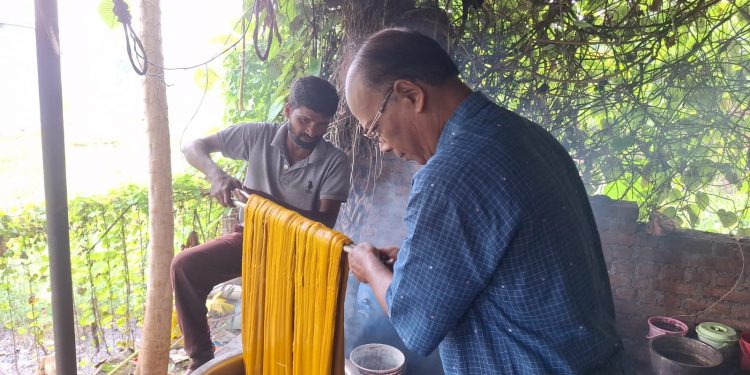Sonepur: The demand for naturally dyed cotton sarees from Subarnapur and Boudh districts is surging, driven by their eco-friendly appeal and durability. These sarees, crafted with organic dyes, are gaining popularity in major cities like Cuttack, Bhubaneswar, Mumbai, Bangalore, Chennai, Delhi, and Kolkata, commanding prices range from Rs 5,000 to Rs 10,000 higher than their chemically dyed counterparts.
Derived from natural sources such as flowers, fruits, tree bark, and seeds, these dyes ensure sarees are skin-friendly, allergen-free, and long-lasting, retaining vibrancy for years. “These sarees don’t cause skin issues and stay intact for a long time,” said Prafulla Meher, a 63-year-old master weaver from Subarnapur’s Gokarneswar Pada. “Their quality is driving market growth.”
Subarnapur’s handloom industry, renowned for its intricate Bandha art, holds a prominent place in the global textile market. The shift to cheaper synthetic dyes in the 1960s nearly erased the labour-intensive tradition of natural dyeing, which uses materials like harida, pomegranate, manjistha, turmeric, jaggery, iron, palash flowers, tea leaves, marigold flowers, aparajita, jamun tree bark, khair, jackfruit wood, henna, tulsi, jhapada seeds, and lac. Meher, a national award-winning weaver, has been reviving this tradition since 1991.
Also Read: National Handloom Day celebrated in Capital city
Born into a weaving family in Birmaharajpur of Subarnapur district, he joined Odisha’s Handloom and Textile Department, earning the National Merit Award in 1992. After his retirement, he established workshops in Subarnapur’s Patabhadi and Boudh’s Basudevpali, employing over 100 families and providing training to new weavers. Meher has developed 65 distinct natural dye shades, creating eco-friendly, lightweight, and soft sarees that remain comfortable even in 45-degree Celsius heat. His acclaimed designs, including the “Ganit” (mathematics) and “Ashtanayika” sarees, have earned national and state recognition, with the latter receiving a Merit Award.
Under his guidance, 19 Sonepur weavers have received prestigious awards. His sarees, priced between Rs 20,000 and Rs 80,000, reflect the meticulous dyeing and weaving process. “Natural-dyed sarees are eco-friendly, lightweight, and retain their colour no matter how often they’re washed,” Meher said. With growing consumer interest in organic products, these sarees blend heritage with sustainability, meeting the demands of a discerning market.






































